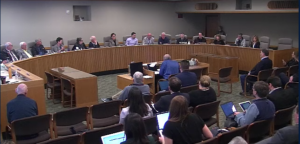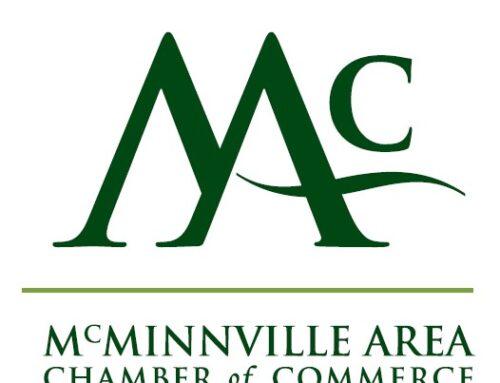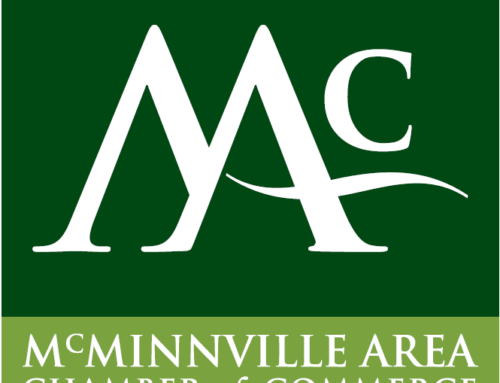
(The Joint Emergency Board of the Oregon Legislature Meets 3.9.2020)
Oregon’s 2020 Legislative Session ended abruptly last week, three days prior to its constitutionally mandated adjournment (known as sine die) of midnight Sunday. Just three bills (and two Resolutions) made it to the Governor’s desk this session. While none of them were particularly consequential to the business community, they are detailed near the end of this post for members to review.
What Happened?
During afternoon floor sessions on Thursday March 5, House Speaker Tina Kotek and Senate President Peter Courtney told their respective chambers they would not convene additional sessions through the weekend, effectively ending the session early. Both leaders delivered impassioned speeches regarding their Republican colleagues’ decision to walk out to prevent the passage of a Cap & Trade bill – SB 1530 – and the inability of the Legislature to function without a two-thirds quorum of its members. Speaker Kotek’s remarks can be viewed here and President Courtney’s, here. House Republican Leader Christine Drazan’s written response is available here.
With many meaningful pieces of legislation dead, and numerous budgetary changes and policy concepts on hold until either the Governor convenes a Special Session between now and the end of the year or the 2021 Regular Session begins next January, the Chamber will continue to partner with other local Chambers of Commerce around the state and the Oregon State Chamber of Commerce to monitor state government actions and keep members informed. Among these are the ongoing Corporate Activity Tax rulemaking process at the Department of Revenue, the Oregon Health Authority’s evolving response to the coronavirus/COVID-19 outbreak, and the expected expansion of greenhouse gas regulatory activity at the Department of Environmental Quality (DEQ).
What’s Next?
Due to the abrupt way in which the session ended, the Joint Emergency Board met on Monday morning to discuss and authorize emergency funding for various state agencies in response to critical needs including flood damage in Umatilla County, emergency preparedness, the state’s response to the coronavirus/COVID-19 outbreak, and greenhouse gas emission issues. The meeting marked the first time House and Senate Republicans rejoined their Democratic colleagues for official business in Salem since walking out on February 25.
The hearing was uneventful until the committee arrived at the topic of allocating $5M in emergency funding to DEQ for the purpose of creating 10 new permanent positions responsible for rulemaking and other actions with the goal of reducing greenhouse gas emissions across all sources. This item passed along party lines, while others passed unanimously. The additional funding is a signal that the Governor intends to pursue executive action through DEQ as a response to the failure of SB 1530 (Cap & Trade) this session.
Governor Brown and legislative leaders have already signaled that a Special Session may be convened this spring or fall to revisit bipartisan concepts and pass important bills that became collateral damage amid the collapse of the 2020 Session. The Governor made it clear that she expected legislative leaders of both parties to send her a plan for a functioning session before she would do so.
In Other News
Governor Brown officially declared a state of emergency over the spread of the novel coronavirus. In a press conference on Sunday, the Governor said, “this emergency declaration gives the Oregon Health Authority and the Office of Emergency management all the resources at our state’s disposal to stem the spread of this disease.”
At a meeting of the Yamhill County Board of Commissioners last week, the County’s new Health and Human Services Director Lindsey Manfrin told Commissioners her department is prepared for local spread of the virus and the disease it causes and is proactively working with other local government entities to ensure they are equipped for prevention and response activities. This News Register article does an excellent job of summarizing local authorities’ response to the coronavirus.
Other resources regarding the coronavirus include:
Oregon’s Bureau of Labor and Industries’ (BOLI) call line for employers: (971-673-0824),
Oregon Business and Industry’s conference call (recording) for Oregon businesses, and
The U.S. Chamber of Commerce published a helpful Guide for Employers
As the legislative session came to a halt in Salem on Thursday, the Chamber’s Government Affairs Council was meeting to discuss the session and to hear updates from Dave Haugeberg of the Yamhill County Parkway Committee and Chris Eyler, the NW Region Executive Director for the U.S. Chamber of Commerce. Mr. Haugeberg brought the GAC up to speed on the latest developments around Phase II of the OR 18 Newberg Dundee Bypass, and Mr. Eyler provided an update on what the U.S. Chamber has been working on in Washington, D.C. Members interested in applying to the Chamber’s Government Affairs Committee are encouraged to fill out an application by clicking here.
Bills and Resolutions Signed into Law in 2020
SCR 202: Commemorating 100th anniversary of federal Soldier’s Rehabilitation Act of 1918
SCR 203: Recognizing 2019 Oregon Women of Achievement
HB 4061: Relating to cultural registration plates
What it does: Increases the surcharge for Oregon Cultural Trust vehicle registration plates from $30 per pair to $50 per pair.
HB 4106: Relating to the withdrawal of territory added to a district by a vote of electors
What it does: Provides that a city in Clackamas County annexed into county parks and rec. service district between 1/1/2005 and 12/31/2006 by vote of city electors is deemed withdrawn from and no longer part of county service district as of 6/30/2020. This settles a legal dispute between Clackamas County and the City of Happy Valley.
HB 4140: Relating to students diagnosed with a brain injury
What it does: Requires Department of Education to develop form (by 8/1/2021) for public education programs to use when student has been diagnosed with concussion or other brain injury. Form must describe nonmedical academic accommodations that a public education program may provide for diagnosed students.
Bills We Were Tracking This Session
HB 4047: Relating to Transient Lodging Taxation
What it does: This bill would have maintained the state transient lodging tax rate at 1.8%. The rate will decrease from 1.8% to 1.5% on July 1, 2020 in accordance with a sunset provision that was embedded in the bill that raised the tax from 1% to 1.8% – HB 4146 (2016). This may be avoided if the Governor calls a Special Session of the Legislature and this issue gets included for consideration during it.
HB 4009: Relating to Corporate Activity Tax
What it does: This bill would have modified administrative provisions of the corporate activity tax. It would have exempted from taxation certain sales of milk and manufactured dwelling park nonprofit cooperatives, allowed unitary group taxpayers to exclude members lacking ties to Oregon, and allowed for an alternative calculation of cost inputs for taxpayers engaged in farming operations (35% of non-labor operating expenses) for the purposes of calculating their subtraction.
HB 4010: Relating to Opportunity Zones
What it does: This bill would have adjusted Oregon’s connection to the federal Opportunity Zone program. It would have likely had the effect of hindering investment in federal qualified opportunity zones in Oregon as it reduced one of the tax advantages of doing so for investors with capital gains funds. Specifically, it would have added to statute, for corporate and personal income filings, a provision that requires taxpayers selling or exchanging opportunity zone property to compute basis for Oregon as 50% of the fair market value (FMV) of the investment at the time of sale or exchange, in lieu of the federal basis adjustment under the program.
HB 4087: Relating to Employment
What it does: This bill would have transferred civic penalty reserves (approx. $100,000 per year) to fund technical assistance for employers in Eastern Oregon and fund the free online publication of BOLI technical assistance and compliance manuals. It was generally supported by the business community after it was amended to include language that would cap the amount of civil penalties that could be transferred to BOLI for this purpose. That language was later amended out of the bill in Ways & Means.
HB 4112: Relating to Child Safety
What it does: This bill would have established a new Child Abuse Assessment Account within the State Treasury for the purpose of funding a grant program for children’s advocacy centers (CACs). These centers include Juliette’s House and Henderson House here in McMinnville. The bill had broad bipartisan support and our Government Affairs Council voted to authorize Chamber staff to draft testimony in support of the bill. While testimony was never submitted, staff attended a meeting in Salem regarding the bill to ensure it had a clear path to passage.




